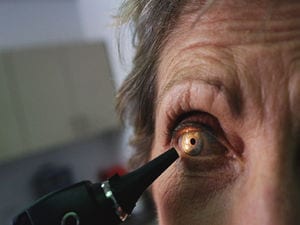
WEDNESDAY, Feb. 28, 2018 (HealthDay News) — By looking deeply into your eyes, doctors might be able to predict your future risk for dementia and memory loss.
Unhealthy changes to the blood vessels of the retina could mirror changes taking place in the brain’s blood vessels, and that could contribute to a decline in mental ability, a new study suggests.
People with moderate to severe retinal damage are more likely to have bigger declines in memory and thinking over two decades than those with healthy eyes, researchers discovered.
“The eyes are the windows to the brain, because the vasculature within the retina and within the brain is so similar,” explained lead researcher Jennifer Deal. She’s an assistant scientist with the Johns Hopkins Bloomberg School of Public Health in Baltimore.
Doctors know that small blood vessel blockages and ruptures in the brain contribute to both dementia and Alzheimer’s, said Dr. Sam Gandy, director of the Mount Sinai Center for Cognitive Health and NFL Neurological Care in New York City.
Unfortunately, these brain blood vessels are so small that they can’t be viewed in a living person with existing technology, Gandy and Deal explained.
“Even using something like MRI, we actually can’t see those very small changes in those small blood vessels in the brain,” Deal said.
However, very similar blood vessels are examined every day by ophthalmologists when they conduct routine examinations of patients’ eye health.
“Blood vessels in the eye are very similar to those in the brain. They’re similar both anatomically and physiologically,” Deal said. “We think by looking at these blood vessels in the eye, that’s actually giving us an idea about changes that might be occurring in the blood vessels of the brain.”
To see whether eye health might predict brain health, Deal and her colleagues pulled data from a long-term study of heart risk factors.
People involved in the large study were recruited between 1987 and 1989, at ages 45 to 64, and were asked to take tests of their memory, language skills and planning ability at regular intervals.
The researchers also found over 12,300 of the participants had had a photograph taken of one retina in the early 1990s. The team compared the health of the participants’ retinas to their ongoing brain health, to see if those with more blood vessel damage in their eyes wound up with greater mental decline over the course of two decades.
The retinas are the light-sensitive lining along the back wall of the eye. Blood vessel blockages and bleeding can damage the retina, threatening a person’s sight.
Researchers examined the photographs for signs of micro-aneurysms and hemorrhages in the retinas, Deal said. They also looked for “cotton wool spots,” fluffy white patches on the retina that suggest blocked blood vessels.
“We found that retinopathy (retinal damage) and measures associated with retinopathy were associated with faster rates of decline over 20 years,” Deal said.
Gandy said the potential of this screening technique is “exciting” because it could provide doctors with an easy way to assess a person’s future risk for dementia.
“If this holds up under independent replication, this could be incredibly useful to researchers and clinicians, both for diagnosis and potentially as an endpoint for clinical trials of drugs aimed at improving cerebrovascular circulation,” Gandy said.
Deal pointed out that retinal examinations are noninvasive and done on a daily basis by eye doctors everywhere, making them an easy way to look at blood vessel health.
But she added that “it is probably premature to say we should be conducting these eye exams and using that to predict who will have cognitive decline.”
Newer technologies are coming along that provide an even better look at the blood vessels of the retina, and those will be even more accurate at finding retinal damage, Deal added.
In the meantime, she suggested that people who are told by their ophthalmologist that they’ve suffered retinopathy should share the news with their family doctor.
Such eye damage indicates a chronic health condition like diabetes or high blood pressure that might need to be more tightly controlled, Deal said. Clamping down on these chronic illnesses could help a person’s overall health, including their future brain health.
The study was published online Feb. 28 in the journal Neurology.
More information
The American Optometric Association has more about diabetic retinopathy.
